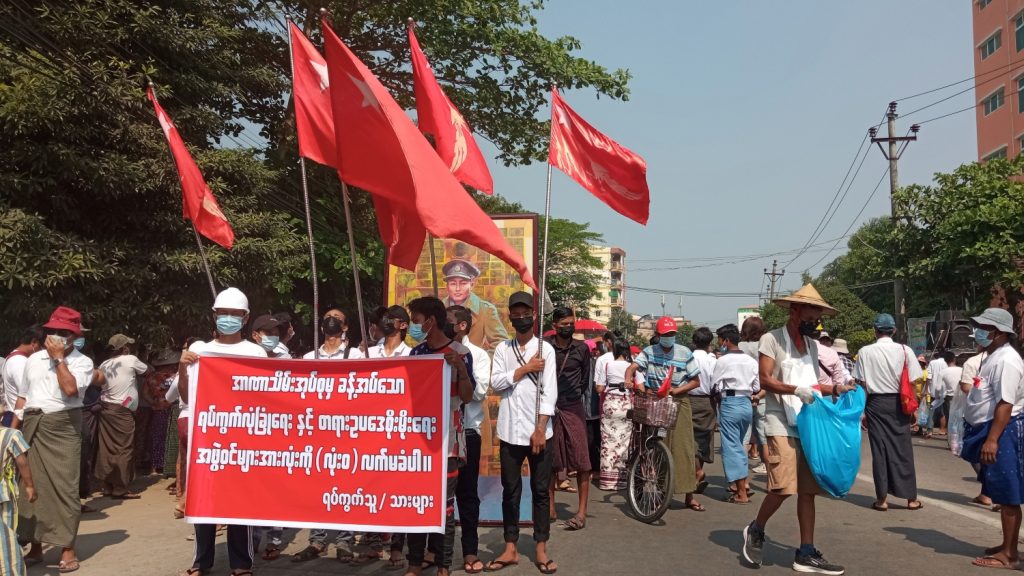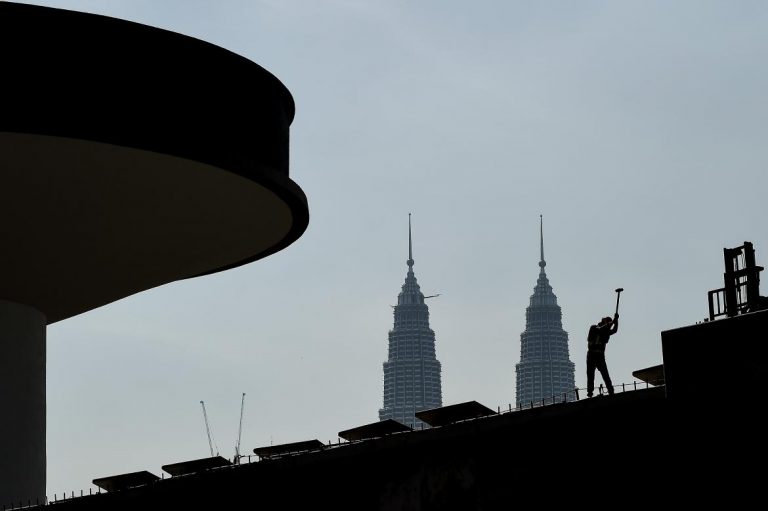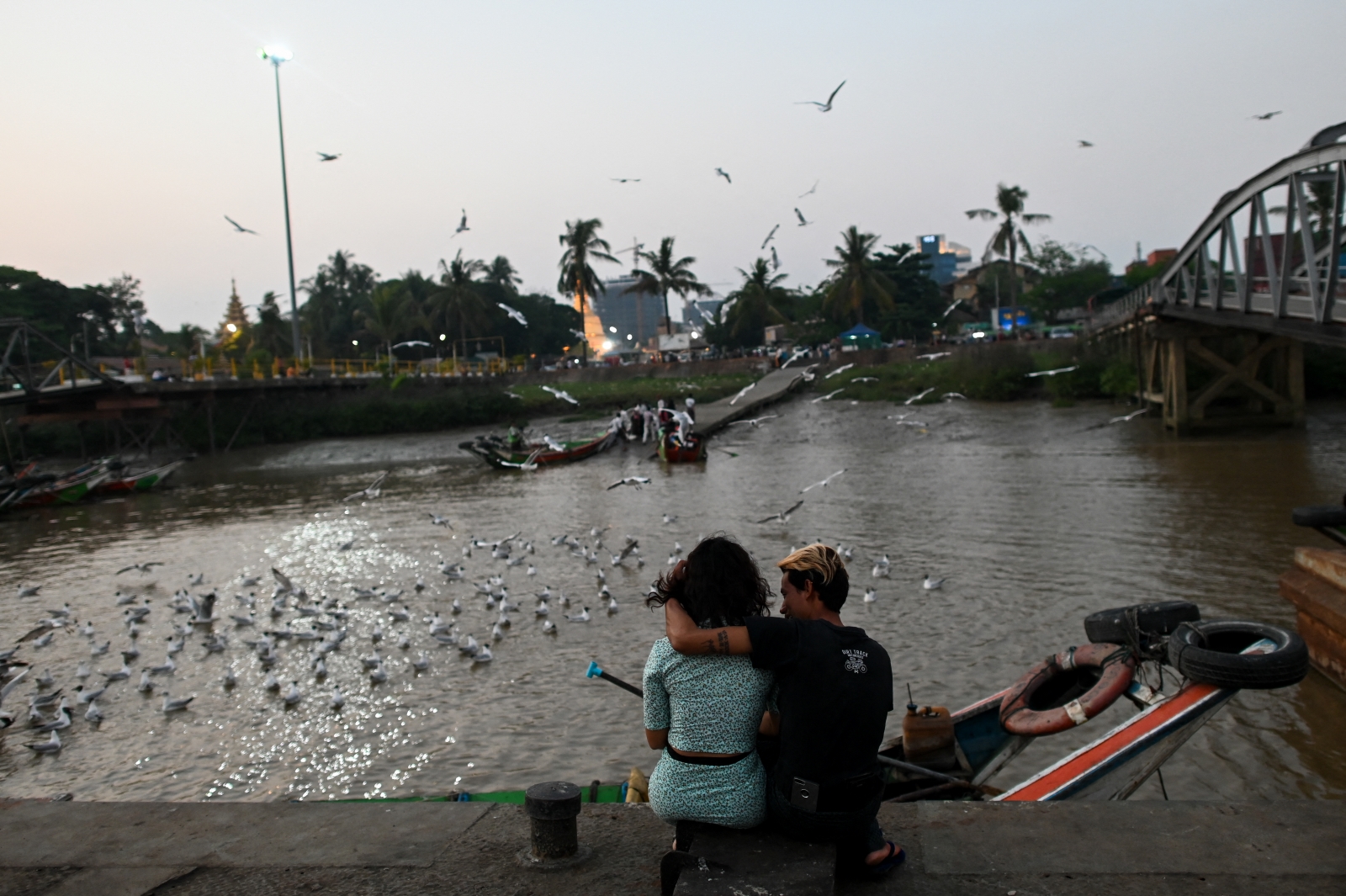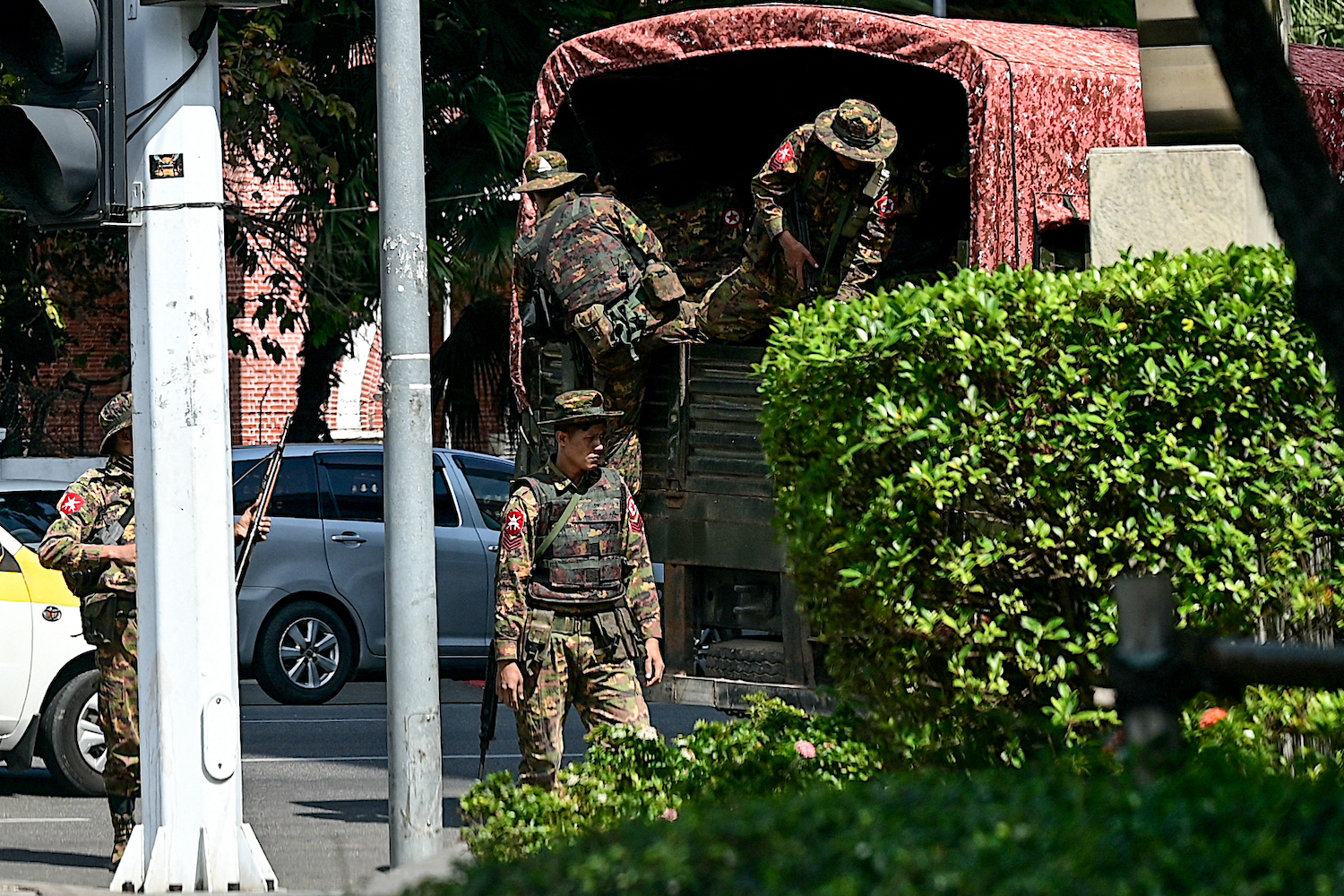City residents are rejecting junta-appointed “security and rule of law teams” and instead forming parallel local government structures that answer to elected MPs.
By FRONTIER
“They are the mad dictator’s appointed servants,” a demonstrator shouted as a crowd occupied a ward administration office in Yangon’s North Okkalapa Township on February 23. Others entering the small, empty room in the township’s Ward C shouted that they didn’t want any “dictators” directing the office, while some removed furniture in protest.
Similar demonstrations took place in townships across the country, and they continued for several days, while images spread online of ward offices padlocked or barricaded by defiant residents. One such protest on February 25 in Yangon’s Tarmwe Township was stormed by police wielding batons and firing rubber bullets. Local residents said at least 15 people were arrested that night.
This outrage was sparked by the military junta’s announcement on February 22 that it would form Security and Rule of Law Teams in wards and village tracts nationwide. Given the task of ensuring law and order in local communities, they may prove vital to the junta’s attempts to control and monitor the population amid nationwide dissent.
“They are pets of the junta,” said Ko Myo Wai, a resident of Yangon’s Ahlone Township. He told Frontier he believed the junta-appointed teams would work with police to arrest dissidents at night.
U Thet Naing Swe, a North Okkalapa resident, said the new security teams were a “danger” to all citizens. “These people will stab residents in the back,” he said. “They will help the police and point to the houses of people who are active in the revolution.”
The creation of the new teams is the latest measure taken by the junta to remould the country’s administration. On February 3, it formed new district and township administration councils across the country, including in self-administered zones. Each are chaired by General Administration Department officers and include representatives from the military, police and immigration department, as well as the local community.
Depending on the size of a ward or village tract, the security teams consist of between five and 10 members of the community chosen by their township administration council. The junta’s February 22 announcement said the councils would pick those committed to “national politics”, as opposed to party politics, and who stand by the “three national causes” that the Tatmadaw has espoused for decades. These are non-disintegration of the Union, non-disintegration of national solidarity and the perpetuation of sovereignty.
However, Yangon residents who spoke to Frontier said there were more political reasons for their appointment.
“Most of them are men from the USDP, or those who have good connections with the military,” said North Okkalapa resident Thet Naing Swe, referring to the military-aligned Union Solidarity and Development Party, which lost badly in the November election.
Residents of North Okkalapa, Ahlone and Hlaing townships in Yangon told Frontier that most of the security team appointees are USDP members, while some were local administrators during the party’s 2011-2016 term in government, or before that.
Former schoolteacher U Myint Swe, who was made head of the security team for North Okkalapa’s Ward B on February 22, told Frontier that he was planning to file criminal complaints against protestors who had “defamed” him. The day after his appointment, a crowd formed in front of his house and shouted insults, including references to a court trial he is facing for allegedly raping a child he was privately tutoring.
Myint Swe was a ward administrator under the former, pre-2011 junta. He denied being a USDP member but confirmed that his son is a high-ranking military officer. He said he accepted his new position because he wanted to protect his ward from “unscrupulous groups” and make it more “peaceful”.
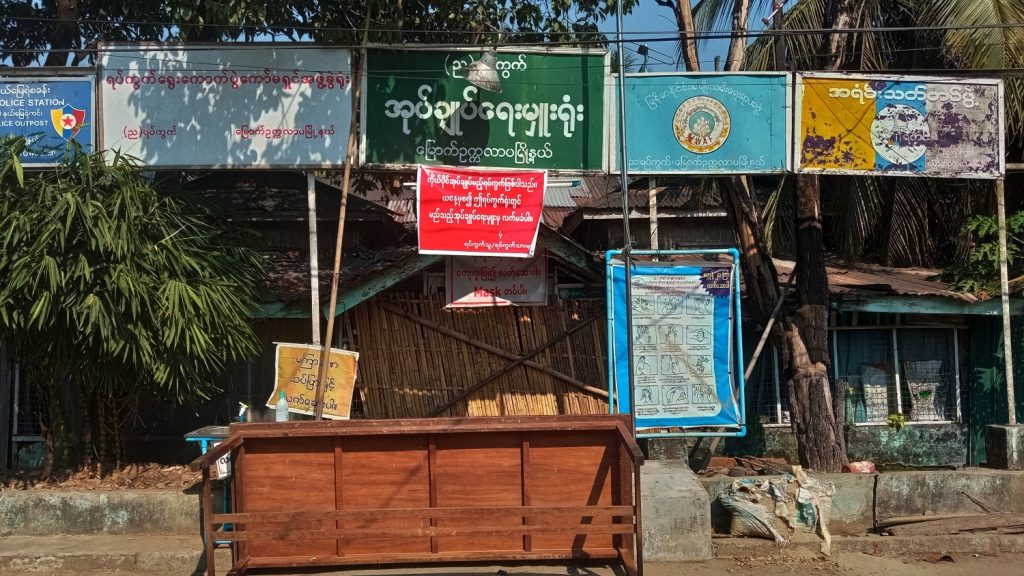
Self-governing wards
The security team’s role conflicts directly with that of neighbourhood watch groups, which communities have established across the country to protect residents from overnight arrests by police, as well as violence from so-called thugs who have allegedly been deployed by the military. Their simultaneous presence will likely spark tension within communities.
The teams’ formation also comes amid dissent in the ranks of ward and village tract administrators, who had been up for re-election in March. These administrators operate under the GAD and are the first point of contact most citizens have with the government. Their election by local communities allowed for a degree of accountability, despite the electoral process falling well short of international standards, for instance by restricting voting rights to one adult per household. (For more on this, read our earlier feature.)
The junta terminated their roles in mid-February. However, elected administrator U Thura Tun from North Okkalapa said that on the day after their dismissal, the GAD township administrator called the ward administrators into his office and asked them whether they wanted to serve under the junta.
“[The township GAD] told me they already had someone to replace me if I declined the offer, but that if I accepted, I would have to obey them,” he told Frontier.
Many administrators have refused to serve and been replaced with alleged military stooges, prompting local protests. However, Thura Tun said he and several others had decided they could do more to help the people from within the system.
“I met with 13 other administrator friends and we decided to continue in our positions because we don’t want their people to control our wards,” he said of the military’s appointees.
He said they were prepared to disobey orders from the township GAD, and that their resolve is already being tested by commands to collect lists of overnight guests from homes – a surveillance measure enabled by the junta’s amendment earlier in February of the Ward or Village Tract Administration Law – and to file criminal complaints against activists.
“I can’t not accept their instructions; these are really evil plans,” Thura Tun said, while conceding that the new security teams would likely carry out the orders instead. He believed the junta had created the teams partly in order to bypass uncooperative administrators like himself.
With this in mind, some administrators have vowed to actively obstruct the security teams. “As an [elected] administrator, I do not accept the new security team. I will not let them rule my ward,” U Kyaw Moe, the administrator of North Okkalapa’s Ward C, told protesters outside the ward office on February 23.
As some administrators go rogue and assist the popular movement against the coup, communities are also forming parallel structures to provide local administration and security in defiance of the junta. In several of the neighbourhoods where residents have padlocked administration offices, they have also put up posters declaring theirs to be a “self-governing ward” and saying, “We won’t accept anyone appointed by the junta.”
The Committee Representing the Pyidaungsu Hluttaw, formed by elected MPs from the National League for Democracy and several other parties as a parallel government to the junta, invited communities on February 22 to form their own governing bodies for their townships, as well as for their wards and village tracts. The CRPH said these bodies should consist of at least 11 members – including elected MPs, youth and trusted community members – and must pledge allegiance to the CRPH.
On February 24, residents of North Okkalapa responded by gathering in a public park and forming their own township committee answerable to the CRPH. This has been replicated across the country, including in Mandalay and the Sagaing Region capital Monywa.
“We need to organise under a collective leadership,” said U Aung Zay, a proud member of the residents’ new governing committee for North Okkalapa.
“We know the dictator’s servants are well-organised, but strong community-based groups are also starting to form,” said U Min Swe, a lawyer who advises the new bodies in Yangon.
He told Frontier that cooperation within and across different communities would make them more secure. “If the ward and township self-governing groups form strong connections, people will not be arbitrarily arrested by the authorities and they can effectively support street protesters,” he said.


